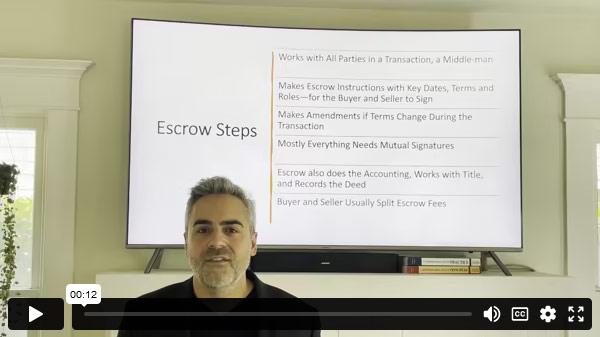
Unveiling the Financial Opportunities As A Real Estate Agent
California sunshine beckons, not just for its warmth and beauty but also for the potential financial rewards it offers aspiring real estate professionals. A California real estate license unlocks a door to a dynamic career path with the potential for high earnings and personal satisfaction.
But how much can you expect to earn with a California real estate license?
Read on as we explore the financial landscape of California real estate, unveiling the factors that influence income, exploring additional revenue streams, and outlining strategies for career progression.
Income Basics: A Glimpse into Real Estate Earning Potential
While a definitive answer to “how much” can be elusive, various sources offer valuable insights.
According to ZipRecruiter, California’s average annual real estate agent salary hovers around $85,000. Indeed indicates the average California real estate agent’s salary is just over $109,000 annually. However, these figures represent a starting point, and your actual income can vary significantly depending on several factors.
Several key elements can influence your earning potential as a California real estate agent.
Let’s explore some of the most significant ones:
- Experience: Like most professions, experience plays a crucial role in real estate. Seasoned agents with a proven track record and a strong network of clients typically command higher commissions. As your experience grows, so does your ability to handle complex transactions, negotiate effectively, and attract more clients, ultimately leading to a higher income.
- Location: The geographic location where you market your services significantly impacts your earning potential. Areas with high property values generally offer the potential for larger commissions. However, don’t discount the success that can be attained in more affordable markets. Factors like housing inventory, market dynamics, and competition within a specific location also influence your earnings.
- Specialization: California’s diverse real estate landscape offers a wealth of opportunities for specialization. Focusing on a specific niche, such as residential, commercial, luxury properties, or property management, allows you to develop a deep understanding of that market segment. This expertise often translates into higher fees and a reputation for excellence, attracting clients seeking a specialist’s touch.
Understanding Commission Structures for California Real Estate Agents
The compensation for California real estate agents hinges on commission structures involving several splits.
- Seller’s Commission: This is a percentage of the selling price, typically 1% to 6%, negotiated between the seller and the listing agent. High-value properties (above $1 million) might have slightly lower rates (4-5%).
- Splitting the Commission Pie: The total commission is then divided between the listing agent (who represents the seller) and the buyer’s agent. A 50/50 split is standard, but variations exist. Listings might offer a higher share to buyer agents to attract more interest, or the listing agent might take a more significant portion (e.g., 3.5%) to cover selling expenses while offering a smaller portion (e.g., 2.5%) to the buyer’s agent.
- Dual Agency: Sometimes, a single agent represents both the buyer and seller (dual agency). This agent then receives the full commission.
- Agent-Broker Split: The agent’s commission is further divided with their employing broker. This split varies depending on experience, with new agents receiving a closer split (e.g., 50/50) and seasoned agents potentially receiving a more significant portion (e.g., 70/30 or 80/20).
- Alternative Arrangements: Some brokerages might offer a flat monthly fee, with the agent retaining the entire commission. Another option is a sliding-scale split, where the agent’s share increases as their sales volume grows (starting from a lower percentage like 40/50 or 50/50).
Keep in mind that additional broker fees on top of commission splits might apply monthly, yearly, or per-sale.
Tax Considerations for California Real Estate Agents
Unlike salaried employees whose employers withhold taxes, California real estate agents, classified as independent contractors, manage their tax obligations. This adds an extra layer of complexity to financial management. However, it also offers the potential for tax deductions on business expenses. Real estate agents must pay estimated federal and state income taxes quarterly throughout the year.
The estimated federal taxes encompass income tax, self-employment tax, and Social Security and Medicare contributions. These contributions are essential for future benefits, but unlike traditional employment, real estate agents are responsible for the total employer and employee share. Referring to the latest tax brackets is crucial for calculating the appropriate quarterly payment amounts.
California also levies its income tax. While it boasts the most income tax brackets in the nation, the highest marginal rate of 12.3% only applies to very high earners. Most California real estate agents and brokers will fall into a lower tax bracket, ranging from 0% to 9.3%. Remember, real estate income fluctuates depending on the market and individual performance.
Responsible tax planning is essential to avoid underpayment penalties and ensure you’re setting aside enough for quarterly payments. Consulting with a tax professional experienced in real estate can be invaluable. They can help you navigate deductions for business expenses like marketing materials, travel, and home office costs, potentially lowering your overall tax burden. By proactively managing your tax obligations, you can maximize your financial success in the dynamic world of California real estate.
Expanding Your Income Horizon: Beyond Commissions
A California real estate license empowers you to explore a wealth of additional revenue streams beyond traditional commissions.
There are several avenues for you to consider, each offering unique advantages.
- Rental Properties and Property Management: Leveraging your market knowledge, you can invest in rental properties and manage them yourself. This strategy provides a steady stream of passive income and allows you to build your real estate portfolio. Alternatively, you can offer property management services to other owners. This can be a lucrative option, especially if you manage multiple properties, as you can leverage economies of scale for maintenance and repairs.
- Real Estate Consulting Services: Your expertise can be valuable to a broader audience. Offer consulting services to investors, developers, or homeowners navigating complex real estate transactions. This can be particularly beneficial for clients facing unique challenges, such as distressed properties, probate situations, or 1031 exchanges (tax-deferred property exchanges). Consulting allows you to utilize your skills beyond traditional agent roles and charge premium fees for your specialized knowledge.
- Real Estate Education and Coaching: If you are passionate about sharing your knowledge, consider developing real estate education courses or coaching programs. This can target aspiring agents, investors, or even homeowners seeking to navigate the complexities of the market. You can generate income by creating online courses or workshops while establishing yourself as a thought leader in the industry.
- Affiliate Marketing: The digital age presents exciting opportunities. As a real estate agent, you should partner with companies offering real estate-related products or services, such as mortgage lenders, title companies, or home warranty providers. Promoting these services to your network and earning affiliate referral commissions can create an additional income stream without significant upfront investment.
Creativity and leveraging your diverse skill-set are the keys to maximizing your income potential.
Explore these options, identify those that align with your interests and strengths, and build a multifaceted income strategy that fuels your financial success in the dynamic world of California real estate.
Charting Your Course: From Agent to Broker and Beyond
The California real estate license unlocks a path to exciting career possibilities.
Remember, career progression in California real estate is a continuous journey. You can chart a fulfilling and financially rewarding career path by embracing lifelong learning, exploring new opportunities, and adapting to the ever-evolving market.
Here’s a roadmap to consider, outlining some critical steps for advancement:
Step 1: From Agent to Broker
With experience and fulfilling specific educational requirements, you can transition from a licensed agent to a licensed California real estate broker. Brokers enjoy greater autonomy, possess the ability to open their own brokerage firms, and can manage a team of agents. By becoming a broker, you can increase earning potential through commission splits and foster leadership skills and the ability to build a successful real estate business.
Becoming a broker involves completing additional coursework, passing a specific broker exam, and meeting experience requirements.
Step 2: Building a Real Estate Team
As your business flourishes, consider building a team of agents. This strategic move allows you to expand your reach and take on a larger volume of clients.
By delegating tasks like property showings and paperwork management to qualified team members, you can free up your time to focus on high-value activities such as client acquisition, strategic planning, and business development.
Building a team also fosters a collaborative environment where knowledge and expertise are shared, ultimately elevating the level of service you provide to all your clients. This team-based approach can significantly increase your earnings through commission splits and a growing client base.
Step 3: Embracing Specialization and Niche Expertise
While building a solid foundation in general real estate practices is crucial, consider carving out a niche within the industry. California’s diverse market offers opportunities to specialize in luxury properties, waterfront properties, green building practices, or relocation services.
Developing in-depth knowledge and expertise in a specific area allows you to attract a targeted clientele, command premium fees, and establish yourself as a go-to resource within that niche.
Step 4: Building Your Own Brokerage From
Establishing your brokerage firm is the ultimate path for the highly ambitious and entrepreneurial-minded agent. This allows you to build a brand that reflects your values and vision, define your company culture, and create a platform for attracting top talent.
While the initial investment and workload can be significant, the potential rewards are substantial.
Building a successful brokerage requires strong leadership skills, business acumen, and navigating complex legal and regulatory environments.
Embracing the Journey and Going Beyond the Numbers
Yes, the financial rewards of California real estate are undeniable. However, the true riches lie in the intrinsic value this career path offers. Imagine the profound satisfaction of guiding someone through the momentous occasion of buying or selling a home. You’ll become a trusted advisor, helping them navigate a complex and often emotional process. Witnessing their joy at closing, knowing you played a pivotal role in achieving their dream, is a reward beyond a commission check.
California’s dynamic real estate market provides a constant source of fresh challenges and learning opportunities. Every day is different. You’ll delve into market trends, hone your negotiation skills, and stay abreast of legal and regulatory changes. This intellectual stimulation keeps your work engaging and ensures you’re constantly evolving as a professional.
Beyond the intellectual rewards, a California real estate license empowers you to be your own boss. You can create a work schedule that complements your lifestyle, allowing for a healthy work-life balance. This flexibility is desirable for those seeking to manage family commitments or pursue personal passions. You can chart your course, tailoring your marketing strategies and client interactions to reflect your unique strengths and personality.
Obtaining a California real estate license is an investment in your future. Still, it’s more than just a ticket to a high paycheck. It’s the gateway to a fulfilling career journey where continuous learning, personal growth, and the opportunity to make a tangible difference intertwine.
Suppose the prospect of forging meaningful connections, tackling stimulating challenges, and leaving a lasting positive impact excites you. In that case, a California real estate license might be the key that unlocks your true potential.
So, are you ready to embark on this rewarding adventure?
When you partner with License Solution, a leading California real estate school that has been helping students forge new career paths since 1999, you are taking the first step toward a lucrative career in real estate.
Our online real estate packages utilize a cutting-edge approach to licensing that includes everything you will need to become a successfully licensed California real estate agent. At License Solution, our curriculum goes well beyond the 135 hours of learning required by the DRE, including interactive, online test preparation tools so you pass the California licensing exam on your first try and get started on your career right away.
At License Solution, our courses are designed to help you master your craft, providing the knowledge and integrity necessary to build a successful real estate career.
Contact us today to embark on your journey toward becoming a real estate agent in California and beyond.













